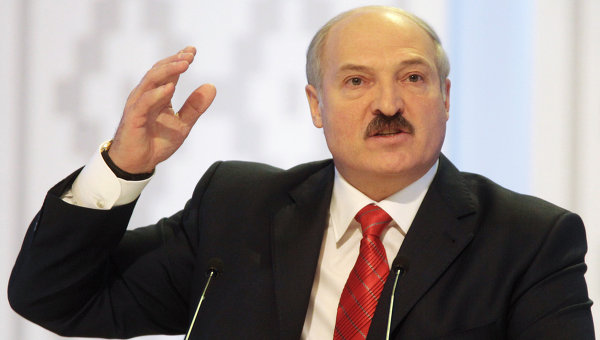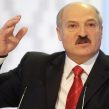
Belarus: The Chernobyl-Scale Fallout From the Crisis in Ukraine
Publication: Eurasia Daily Monitor Volume: 11 Issue: 57
By:

Belarus’s Ministry of Foreign Affairs may have set a record for evasiveness while formulating its March 19 statement vis-à-vis the crisis in Ukraine. “Belarus cannot be indifferent to the events in Ukraine, including the referendum held on March 16, 2014, in the Crimea, and the decision on the Crimea’s accession to the Russian Federation,” the statement reads. “Belarus, Russia and Ukraine are brotherly states intertwined by a common history that goes back centuries. [Many times] have external forces tried to play and capitalize on contradictions [between] our states. Particularly concerned are we now about attempts of the politicians, who in fact have nothing to do with the events in the region, to decide what is good and what is bad for our Slavic peoples. Given the reality, the Republic of Belarus is against [a] one-sided, biased interpretation of the principles of international law to satisfy geopolitical interests, against attempts to declare some international situations and territories unique while ignoring others” (https://www.mfa.gov.by/en/press/news_mfa/e79664430da5569e.html).
The last sentence may be interpreted as a repudiation of the alleged distinction between wresting Kosovo from Serbia and snatching Crimea from Ukraine and, therefore, as a thinly veiled expression of support for Russia. But it is the tricky wordplay that captures one’s imagination first. Contrastingly, Kazakhstan defined the referendum in Crimea in such unequivocal terms as a “free expression of will,” and Astana declared that it was treating “the decision of the Russian Federation with understanding” (https://mfa.gov.kz/ru/#!/news/article/13800). The statement on the site of the Armenian president is couched in similarly plain terms whereby the referendum in Crimea is referred to as “the peoples’ right to self-determination via free expression of will” (https://www.president.am/en/press-release/item/2014/03/19/President-Serzh-Sargsyan-conversation-with-the-President-of-Russian-federation/).
On March 23, President Alyaksandr Lukashenka added to the confusion. On the one hand, he stated that “not unlike [South] Ossetia and Abkhazia, Crimea is no independent state; it is part of the Russian Federation. One can acknowledge this or not—nothing will change the situation.” Yet, on the other hand, he averred that “Ukraine should stay a single, undivided, and non-aligned state” and he warned against the conversion of Ukraine into a federation. Lukashenka also opined that when every prominent politician in Ukraine has a group of 150–1,000 militants at his disposal, there can be no normal elections. And if some irresponsible people “add a spark to that tinderbox, all of Ukraine will explode” (https://news.tut.by/politics/391922.html). Further on, Lukashenka declared that “we will be with Russia” no matter what, but Belarus will be building a relationship with the new power in Ukraine. Lukashenka recalled that the followers of Stepan Bandera committed atrocities in Belarus during World War II, but he refrained from labeling all the members of the provisional government in Kyiv the followers of Bandera. Finally, Lukashenka suggested that Ukraine should be talked out of its decision to withdraw from the Commonwealth of Independent States (CIS) where “one should stay if only for one’s position to be heard” (https://news.tut.by/politics/391925.html).
Apparently, the crisis in Ukraine has put Belarus in a precarious situation. As much as it wants to stay away from recognizing the annexation of Crimea, it feels committed to tightening its economic alliance with Russia, an integration project to which there seems to be no alternative. Belarus’s need for financial assistance appears to be acute. Illustratively, during January and February 2014, Belarus’s GDP shrank by 1.6 percent; investment into production contracted by 18.7 percent; and the volume of freight/cargo transported via Belarus decreased by 6.2 percent (https://naviny.by/rubrics/economic/2014/03/20/ic_news_113_433706/). Unlike Russia, the West never made an attractive offer to Belarus. Even Ukraine was almost lost by the West when former president Viktor Yanukovych opted out of the association agreement with the European Union because Russia offered serious financial assistance. But Belarus incites even less interest on the EU’s part. As Charles Grant, director of the London-based Centre for European Reform, who recently visited Minsk, reportedly said, “I am afraid that your country has been forgotten by the world [read “the West”]. Even when the Eastern Partnership is discussed, everybody talks about Ukraine, then about Moldova and Georgia, but nobody talks about Belarus” (https://news.tut.by/politics/391901.html). At least when certain members of the human rights watchdog groups from Minsk tried to synchronize their understanding of the sheer number of political prisoners in Belarus with that of the European diplomats, they failed to do so.
The resumption of a Cold War–like rhetoric and, possibly, Cold War–type activities between Russia and the West will further undercut Belarus’s sovereignty, believes Valer Karbalevich, a Minsk-based associate of the Belarusian Service of Radio Liberty. This is because the conflict situation adds an ideological component to a geopolitical tug of war over Belarus. Karbalevich also notes the rise of local groups favoring unification with Russia. Such groups were active in the 1990s, then they were sidelined, but now they even make it to a political talk show on the first channel of Belarusian TV (https://www.svaboda.org/content/article/25305067.html).
In Belarus, support for joining Russia or entering Western structures has no regional expression. Whereas in Ukraine, for better or worse, the West (and likewise Russia) could leverage the real cultural divide between Ukraine’s own west and its southeast, in Belarus, the divide in question is no longer visible. In 1994, in the first round of presidential elections, 63.1 percent voted for Lukashenka in Mogilev Oblast (east) and only 36 percent in Grodno Oblast (west). Conversely, a vote for Zianon Pazniak, the Westernizer, was 4.7 percent and 12.8 percent, respectively. By 2006, the electoral divide between the east and west of Belarus had diminished to 11 percentage points in terms of the pro-Lukashenka vote; and in 2010, Grodno gave Lukashenka even more votes than his native Mogilev, according to independent surveys. No statistically significant differences currently exist between east and west Belarus regarding people’s attitudes toward capitalism/socialism and private/public property either. Belarus, therefore, has become largely homogenous (https://naviny.by/rubrics/politic/2014/03/22/ic_articles_112_184982/).
Yet, adding to this homogeneity is precious little, if any, reason for optimism. Indeed, the fallout of the events in Ukraine is likely to be on the scale of Chernobyl. In 1986, that disaster also came to Belarus from the south.




